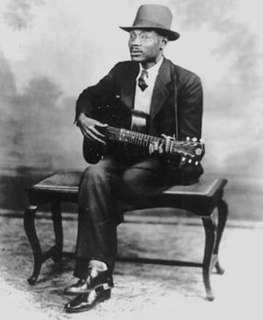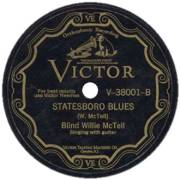Related Research Articles

Blind Willie McTell was a Piedmont blues and ragtime singer and guitarist. He played with a fluid, syncopated fingerstyle guitar technique, common among many exponents of Piedmont blues. Unlike his contemporaries, he came to use twelve-string guitars exclusively. McTell was also an adept slide guitarist, unusual among ragtime bluesmen. His vocal style, a smooth and often laid-back tenor, differed greatly from many of the harsher voices of Delta bluesmen such as Charley Patton. McTell performed in various musical styles, including blues, ragtime, religious music and hokum.

Chapel Hill is a town in Orange, Durham and Chatham counties in the U.S. state of North Carolina. Its population was 61,960 in the 2020 census, making Chapel Hill the 16th-largest city in the state. Chapel Hill, Durham, and the state capital, Raleigh, make up the corners of the Research Triangle, with a total population of 1,998,808.
Piedmont blues refers primarily to a guitar style, which is characterized by a fingerpicking approach in which a regular, alternating thumb bass string rhythmic pattern supports a syncopated melody using the treble strings generally picked with the fore-finger, occasionally others. The result is comparable in sound to ragtime or stride piano styles. Blues researcher Peter B. Lowry coined the term, giving co-credit to fellow folklorist Bruce Bastin. The Piedmont style is differentiated from other styles, particularly the Mississippi Delta blues, by its ragtime-based rhythms.

Blind Boy Fuller was an American blues guitarist and singer. Fuller was one of the most popular of the recorded Piedmont blues artists with rural African Americans along with Blind Blake, Josh White, and Buddy Moss.

Blind Willie Johnson was an American gospel blues singer, guitarist and evangelist. His landmark recordings completed between 1927 and 1930—thirty songs in total—display a combination of powerful "chest voice" singing, slide guitar skills, and originality that has influenced generations of musicians. Even though Johnson's records sold well, as a street performer and preacher, he had little wealth in his lifetime. His life was poorly documented, but over time, music historians such as Samuel Charters have uncovered more about Johnson and his five recording sessions.

"Statesboro Blues" is a Piedmont blues song written by Blind Willie McTell, who recorded it in 1928. The title refers to the town of Statesboro, Georgia. In 1968, Taj Mahal recorded a popular blues rock adaptation of the song with a prominent slide guitar part by Jesse Ed Davis. His rendition inspired a recording by the Allman Brothers Band, which is ranked number nine on Rolling Stone magazine's list of the "100 Greatest Guitar Songs of All Time". In 2005, the Atlanta Journal-Constitution ranked "Statesboro Blues" number 57 on its list of "100 Songs of the South".

Reverend Gary Davis, also Blind Gary Davis, was a blues and gospel singer who was also proficient on the banjo, guitar and harmonica. Born in Laurens, South Carolina and blind since infancy, Davis first performed professionally in the Piedmont blues scene of Durham, North Carolina in the 1930s, before converting to Christianity and becoming a minister. After relocating to New York in the 1940s, Davis experienced a career rebirth as part of the American folk music revival that peaked during the 1960s. Davis' most notable recordings include "Samson and Delilah" and "Death Don't Have No Mercy".
Kate McTell was an American blues musician and nurse from Jefferson County, Georgia. She is known primarily as the former wife of the blues musician Blind Willie McTell, whom she accompanied vocally on several recordings. She may have recorded as Ruby Glaze, but there is some uncertainty about whether she and Glaze were the same person, despite the fact that she claimed to be Glaze.
Bruce Bastin is an English folklorist and a leading expert on the blues styles of the southeastern states of America,. In 2022, his publication Red River Blues: The Blues Tradition in the Southeast was inducted into the Blues Hall of Fame, as a 'Classic of Blues Literature'.
James Baxter Long Sr. was an American store manager, owner, and record company talent scout, responsible in the 1930s for discovering Fulton Allen and Gary Davis, among other notable blues musicians.
Peter B. "Pete" Lowry is an American folklorist, writer, record producer, ethnomusicologist, historian, photographer, forensic musicologist, and teacher who deals with aspects of popular music, mainly African American. Born in Montclair, New Jersey, attending Deerfield Academy, and then Princeton University, where he specialized in the biological sciences. Teaching biology for a few years after obtaining a Master's in zoology, he changed his focus to blues and jazz with a primary focus on the Piedmont blues of the south-eastern United States.
Bull City Red was an American Piedmont blues guitarist, singer, and predominately washboard player, most closely associated with Blind Boy Fuller and the Reverend Gary Davis. Little is known of his life outside of his recording career.
Charles Henry Tate, known as Baby Tate was an American Piedmont blues guitarist, who in a sporadic career spanning five decades worked with the guitarists Blind Boy Fuller and Pink Anderson and the harmonica player Peg Leg Sam. His playing style was influenced by Blind Blake, Buddy Moss, Blind Boy Fuller, Josh White, Willie Walker, and to some extent Lightnin' Hopkins.
Blind Willie Walker was an early American blues guitarist and singer, who played the Piedmont blues style. He was described by blues musicians such as Reverend Gary Davis and Pink Anderson as an outstanding guitarist. Josh White called him the best guitarist he had ever heard, even better than Blind Blake: "Blake was quick, but Walker was like Art Tatum." In his performances, he was often accompanied by guitarist Sam Brooks.

John Dee Holeman was an American Piedmont blues guitarist, singer, and songwriter. His music includes elements of Texas blues, R&B and African-American string-band music. In his younger days he was also known for his proficiency as a buckdancer.
Richard Trice was an American blues guitarist, singer and songwriter. He released two singles. He lived most of his life in his native North Carolina and played in its regional blues style, often referred to as Piedmont blues, East Coast blues, or more generally country blues.
Henry "Rufe" Johnson, was an American Piedmont blues guitarist, harmonica player, pianist, banjo player, singer and songwriter. On occasion he played slide guitar with a pocket knife. He finally found a larger audience with his 1973 album, The Union County Flash! His fame was short-lived, as he died months after its release.
"Kid" Prince Moore was an American blues musician, from the United States, who recorded 17 songs from 1936 to 1938. Moore played in a Piedmont blues style, similar to that of Blind Blake. Moore also recorded two Gospel Music tracks, "Church Bells" and "Sign of Judgement". Moore also accompanied blues pianist Shorty Bob Parker on six of his own tracks. Bruce Bastin, in his book Red River Blues: The Blues Tradition in the Southeast, suggested that Moore may have originated from The Carolinas but, as of 2017, there is no documented knowledge of Moore's life.

Frank Fotusky is an American singer-songwriter based in Portland, Maine. He plays six- and twelve-string acoustic guitar, and regularly performs in the Greater Portland area.
References
- 1 2 Eagle, Bob; LeBlanc, Eric S. (2013). Blues: A Regional Experience. Santa Barbara, California: Praeger. pp. 279–280. ISBN 978-0313344237.
- 1 2 3 4 5 6 "Willie Trice: Biography". AllMusic.com. Retrieved 2016-11-17.
- 1 2 3 4 5 6 7 8 9 "Willie Trice & Richard Trice Illustrated Discography". Wirz.de. Retrieved 2016-11-17.
- ↑ "Willie Trice, Blue and Rag'ed, Trix 3305". Weeniecampbell.com. 2010-03-04. Retrieved 2016-11-17.
- 1 2 "Willie Trice, Blue & Rag'd". AllMusic.com. 1995-01-24. Retrieved 2016-11-17.
- ↑ Bastin, Bruce (1995). Red River Blues: The Blues Tradition in the Southeast. p. 292. ISBN 9780252065217 . Retrieved 2016-11-17.
- ↑ "Willie Trice Grave – Marker – Headstone – Blues". Deadbluesguys.com. Retrieved 2016-11-17.